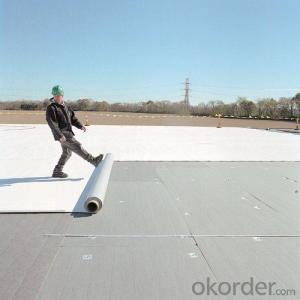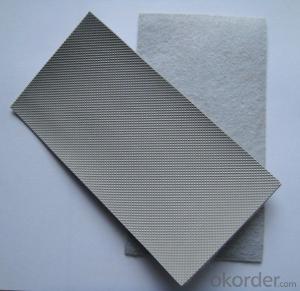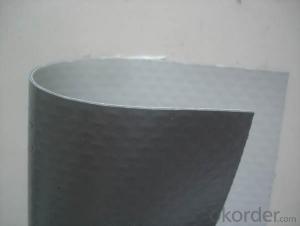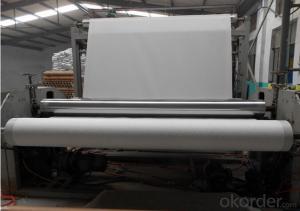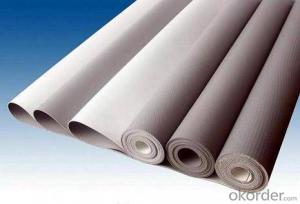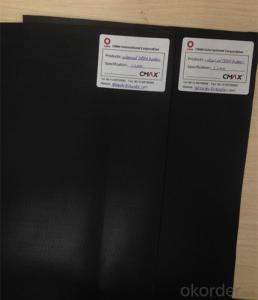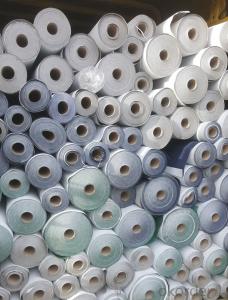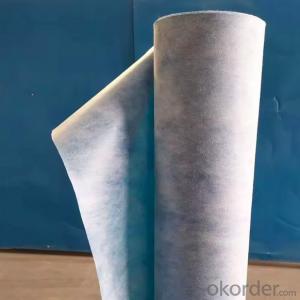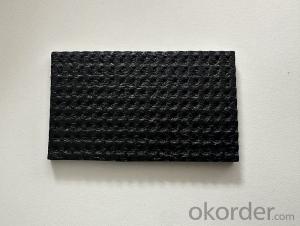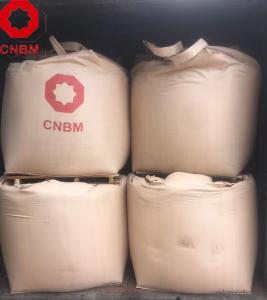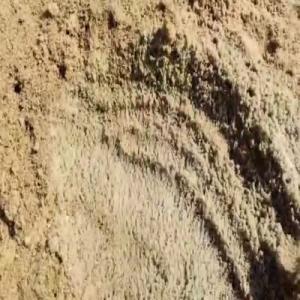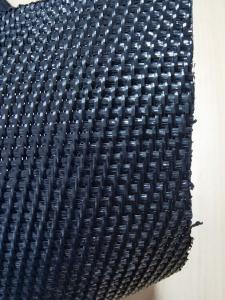PVC Roofing Waterproofing Membrane with UV Resistance
- Loading Port:
- China main port
- Payment Terms:
- TT OR LC
- Min Order Qty:
- 1000 m²
- Supply Capability:
- 50000 m²/month
OKorder Service Pledge
OKorder Financial Service
You Might Also Like
PVC roofing waterproof membrane with UV resistance
PVC membrane can be used for waterproofing on the steel roof, walking roof , planting roof, tunnel, basement, etc.
PVC membrane introduction:
Polyvinyl Chloride (PVC) membrane waterproof membrane is a kind of polymer compound
waterproof membrane compound of polyvinyl chloride colophony, plasticizer, stabilizing agent
,ultraviolet radiation(UV) resistance agent, all kinds of dyes and other agent.
1) Thickness: 0.3mm-2.0mm
2) Color: gray, green, blue
3.) Width: 2.0m
Polyvinyl chloride the pvc waterproofing plastic membrane is a kind of excellent performance of polymer waterproof material,PVC resin as the main raw material,add all kinds of special additive and anti-aging composition,the use of advanced equipment and advanced technology extrusion rolling is made.The product has the tensile strength and elongation high shrinkage of small,low temperature soft good,long life and other advantages, the products wide 1.2m to 3.0m, the thickness of 0.8-2.0 mm(special specifications can be customized),stable performance,reliable quality,construction is convenient.
Application Scope
The products are widely used in all kinds of civil construction,subway,tunnel,water conservancy,landfill site,chemical industry,metallurgy and other areas of waterproof seepage control,corrosion engineering.
Product Category
Single composite PVC waterproof materials
Double composite PVC waterproof board
Seperate PVC waterproof board
Some sticky type PVC waterproof materials
FAQ of PVC Waterproofing Membrane
a.Can we get some samples before place order?
Answer: We can send the free samples to you by freight collect.
b.How many years can your PVC membrane guarantee?
Answer: We will guarantee the quality for 5 years at least.
c.Which countries you ever export the product?
Answer: We export the PVC membrane to South Africa, Middle east and even European countries.
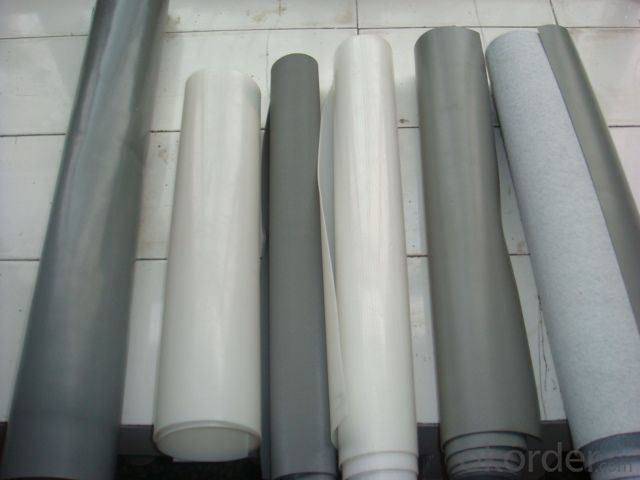
- Q:Does a waterproofing membrane require any specific surface preparation for tile installations?
- Yes, a waterproofing membrane typically requires specific surface preparation for tile installations. The surface needs to be clean, dry, and free of any dirt, dust, or debris. It is important to remove any loose or damaged tiles, repair any cracks or imperfections, and ensure the surface is smooth and level before applying the waterproofing membrane. This preparation ensures proper adhesion and a successful tile installation.
- Q:Can waterproofing membranes be used on swimming pool decks?
- Yes, waterproofing membranes can be used on swimming pool decks. Waterproofing membranes are designed to create a barrier against water penetration, making them an ideal solution for areas that are constantly exposed to water, such as swimming pool decks. By applying a waterproofing membrane to the deck surface, it helps to prevent any water from seeping through and causing damage to the underlying structure. Additionally, waterproofing membranes can also provide protection against chemicals, UV rays, and general wear and tear, which are common in swimming pool environments. Overall, using waterproofing membranes on swimming pool decks can help extend their lifespan, reduce maintenance costs, and enhance the overall safety and appearance of the area.
- Q:Can a waterproofing membrane be used for loading docks or ramps?
- Yes, a waterproofing membrane can be used for loading docks or ramps. Waterproofing membranes are designed to protect surfaces from water damage and can provide an effective barrier against water penetration. Using a waterproofing membrane on loading docks or ramps can help prevent water seepage and potential structural damage, providing added durability and longevity to the surfaces.
- Q:Can waterproofing membranes be applied on roofs?
- Yes, waterproofing membranes can be applied on roofs. These membranes are specifically designed to provide a protective layer against water infiltration and are commonly used in the construction industry to waterproof various types of roofs, including flat roofs, pitched roofs, and sloped roofs.
- Q:Are waterproofing membranes resistant to chemicals?
- Waterproofing membranes are generally resistant to chemicals, providing a protective barrier against water infiltration. These membranes are typically made from materials like PVC, TPO, or EPDM, which possess excellent chemical resistance properties. Their engineering ensures they can endure exposure to various chemicals like acids, alkalis, solvents, and oils without deteriorating. This chemical resistance guarantees that waterproofing membranes can maintain their integrity and effectiveness even in environments with common chemical exposure, such as industrial settings, laboratories, or chemical storage areas. However, it is important to consider that the specific chemical resistance capabilities may differ based on the type and quality of the chosen waterproofing membrane. Therefore, it is crucial to select the appropriate membrane that matches the project's specific chemical exposure requirements.
- Q:Can a waterproofing membrane be used on precast galvanized surfaces?
- Precast galvanized surfaces can benefit from the use of a waterproofing membrane. This membrane serves as a safeguard against water infiltration and can be applied to various surfaces, including precast galvanized ones. By preventing water from seeping into the surface, the membrane safeguards the underlying structure from moisture damage. However, it is crucial to prepare the precast galvanized surface adequately before applying the membrane. This involves removing any loose or flaking galvanized coating to ensure proper adhesion of the membrane. Furthermore, it is recommended to consult the manufacturer or supplier of the waterproofing membrane to guarantee compatibility with galvanized surfaces and to follow their recommended application guidelines for optimal outcomes.
- Q:Are waterproofing membranes suitable for historical preservation projects?
- Depending on the specific circumstances and goals of a historical preservation project, the use of waterproofing membranes may be suitable. Waterproofing membranes are designed to prevent water infiltration and protect historical structures from moisture damage. In certain situations, historical buildings may have deteriorated or ineffective existing waterproofing systems. In these cases, modern waterproofing membranes can be a viable option to preserve and safeguard the structure. These membranes can be discreetly installed without altering the building's original appearance or architectural integrity. However, it is crucial to exercise caution when considering the use of waterproofing membranes in historical preservation projects. The potential impact on the authenticity and historical value of the structure must be carefully assessed. Some historical buildings may require specialized preservation techniques due to unique construction methods or materials, making alternative preservation methods more appropriate than using membranes. Furthermore, the long-term consequences and maintenance requirements of waterproofing membranes should be taken into account. Certain membranes may have a limited lifespan, necessitating periodic inspections and maintenance to ensure their continued effectiveness. This ongoing maintenance should be included in the preservation plan and budget. Ultimately, the decision to incorporate waterproofing membranes into historical preservation projects should be based on a thorough evaluation of the building's specific needs, characteristics, and preservation objectives. Consulting preservation experts, architects, and engineers can help determine the most suitable approach for each unique project.
- Q:Does a waterproofing membrane provide any protection against radon gas?
- No, a waterproofing membrane does not provide any protection against radon gas. Radon gas is a radioactive gas that can seep into buildings through cracks and openings in the foundation or walls. While a waterproofing membrane can help prevent water penetration and moisture issues, it does not provide an effective barrier against radon gas. To protect against radon gas, specific radon mitigation measures such as sealing cracks, installing a radon mitigation system, or improving ventilation should be implemented. It is important to consult with radon professionals who can assess the radon levels in your area and provide appropriate recommendations to mitigate the gas.
- Q:Can a waterproofing membrane be used in bathrooms or showers?
- Yes, a waterproofing membrane can be used in bathrooms or showers. In fact, it is highly recommended to use a waterproofing membrane in these areas to prevent water damage and leakage. A waterproofing membrane acts as a barrier that prevents water from penetrating through the walls, floors, and other surfaces in the bathroom or shower. It is typically applied before tiling or finishing the surfaces, providing an extra layer of protection against moisture and ensuring that the underlying structure remains dry. This not only helps to prevent mold and mildew growth but also prolongs the lifespan of the bathroom or shower.
- Q:Can a waterproofing membrane be used in new construction?
- Yes, a waterproofing membrane can be used in new construction. In fact, it is often recommended to install a waterproofing membrane during the construction phase to provide an added layer of protection against water damage. Waterproofing membranes are typically applied to the exterior foundation walls and basement floors to prevent water infiltration and to create a barrier against moisture. This can help to prevent issues such as leaks, mold, and structural damage in the future. Additionally, waterproofing membranes can also be used in other areas of a new construction project, such as roofs, balconies, and bathrooms, to ensure long-lasting waterproofing protection. Overall, using a waterproofing membrane in new construction can help to prolong the lifespan of the building and provide peace of mind for the occupants.
1. Manufacturer Overview |
|
|---|---|
| Location | |
| Year Established | |
| Annual Output Value | |
| Main Markets | |
| Company Certifications | |
2. Manufacturer Certificates |
|
|---|---|
| a) Certification Name | |
| Range | |
| Reference | |
| Validity Period | |
3. Manufacturer Capability |
|
|---|---|
| a)Trade Capacity | |
| Nearest Port | |
| Export Percentage | |
| No.of Employees in Trade Department | |
| Language Spoken: | |
| b)Factory Information | |
| Factory Size: | |
| No. of Production Lines | |
| Contract Manufacturing | |
| Product Price Range | |
Send your message to us
PVC Roofing Waterproofing Membrane with UV Resistance
- Loading Port:
- China main port
- Payment Terms:
- TT OR LC
- Min Order Qty:
- 1000 m²
- Supply Capability:
- 50000 m²/month
OKorder Service Pledge
OKorder Financial Service
Similar products
New products
Hot products
Hot Searches
Related keywords
